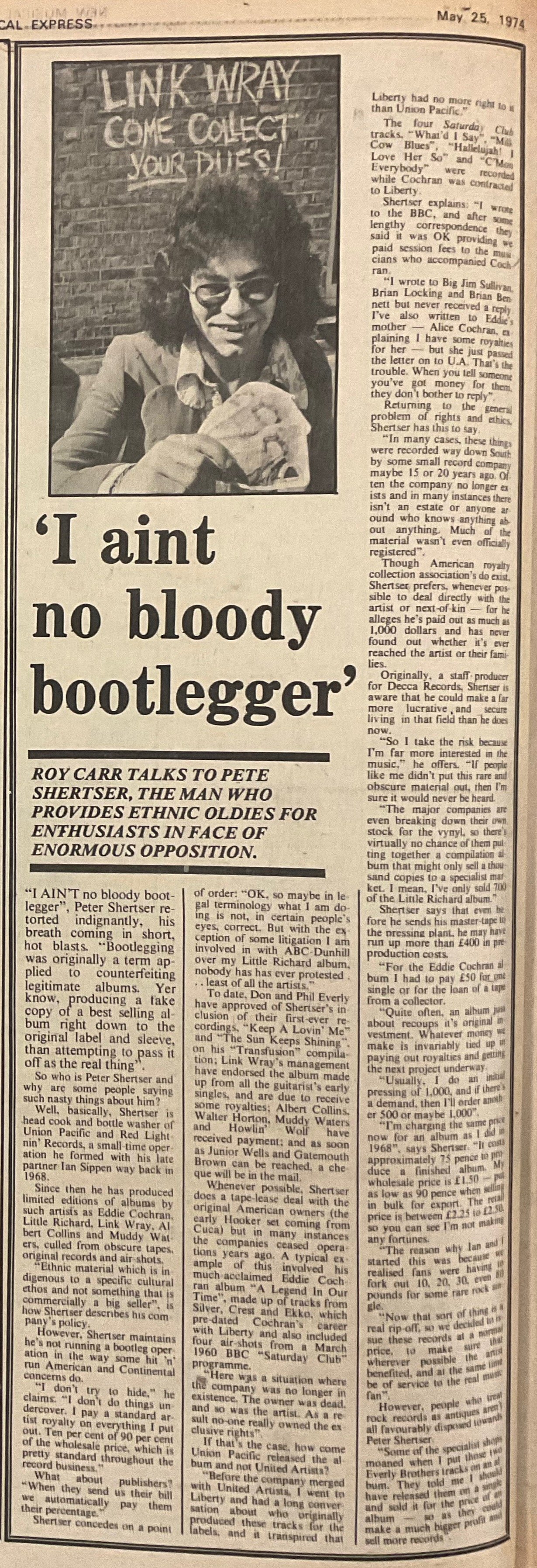A recent bit of deep digging uncovered Transfusion: Rave from the Grave – Blast From the Past Vol.1 (Union Pacific, UP004). The compilation features the Del Vikings, the two Ronnies – Self and Hawkins – Conway Twitty, Nervous Norvus, Everly Bros, Al Downing, John Greer, and Vince Taylor and the Playboys with ‘Brand New Cadillac’ – a great collection. What sets it apart from, and at odds with, other early 1970s compilations is its sleeve featuring a typically salacious panel from a Robert Crumb comic. No Teddy Boys in the company of a Bardot-like leggy model and a late-sixties styled custom chopper, nor fifties convertible outside a diner, not even a Rock-Ola jukebox. Pasted together in 1972 by Ian Sippen and Peter Shertser, the album connects the period’s rock ’n’ revivalists with the British underground culture of the day as represented by the likes of International Times, Mick Farren and the Pink Fairies.
Volume 2, Loose Ends (UP005) is an all-instrumental collection bookended by Johnny ‘Guitar’ Watson and The Fireballs. In between, Duane Eddy battles it out with the Fenderman, Jerry Lee Lewis and a half-dozen other contenders. The sleeve continues the graphic connection with the underground, featuring a tattooed greaser mauling a hot chick in a state of dishabille who threatens to stab him in the ‘puddin’. The panel is given a context of sorts by the incongruous tag-line: ‘Sexism is out! If you like pussy: treat it equal.’ It’s culled from the back page of George DiCaprio and R. Jaccoma’s Greaser Comics (New York: Half Ass Press, 1971), which suggests a transatlantic counter-culture mirroring of interest in rock ’n’ roll.
‘A new exciting label featuring oldies but goodies, rockabilly and rock ‘n’ roll’
Sippen and Shertser were Jewish East End Mods who made a name for themselves on the scene as The Firm. They ran in the same circles as the likes of Miles at Better Books and IT fame, and Dave ‘Boss’ Goodman, later Pink Fairies roadie and manager of Dingwalls dance hall. The Firm were involved in the UFO club, helping Mick Farren to keep out ne’er-do-wells when they weren’t pulling pranks on John Peel. With such connections, and a deep love of American rhythm and blues, the duo helped to produce and distribute The Deviants’ debut album. They sold the LPs’ American rights to Seymour Stein’s newly formed Sire records and then acted as talent scout for him, the results of which included an album they recorded in 1968 in London with Walter ‘Shakey’ Horton and another in 1969 by psych blues rockers Sam Apple Pie.
Shertser is a singular contributor to Jonathan Green’s pop-vox history of the sixties underground, Days in the Life (1988), which is where most of the references to him and Sippen are drawn from, including Clinton Heylin’s Bootleg: The Secret History of the Other Recording Industry (1994). The Firm were responsible for the first tranche of illicit Dylan, Stones and Beatles albums in the UK. The two volumes of rock ’n’ roll obscurities and hits are essentially bootlegs; there is nothing to suggest these tracks were licensed. Other releases on their Union Pacific label included collections of Eddie Cochran, Link Wray and Little Richard rarities.
Ian Sippen went missing, presumed drowned, in Morocco in April 1973. Shertser continued to run Red Lightnin’ and associated labels (Syndicate Chapter), which he and Sippen had set up in 1969.
You can read Greaser here. The hard-on in the pop corn seen in Barry Levinson’s Diner (1982) gets an earlier recounting. Perhaps, like the filthy lyrics in ‘Louie Louie’, this courtship ritual is part of American teenage folklore.
Depending on which version you’re looking at, the Pink Fairies debut 1971 album, Never Never Land, has the legend ‘Long Live Rock and Roll’ on either its inside sleeve or on its rear cover. The illustration that adorns the front is about as rock ’n’ roll as Robert Crumb’s fedora.
Mick Farren in International Times #161 (August 1973)
. . . and in Peter Shertser’s own words to Roy Carr, NME (May 25 1974)












